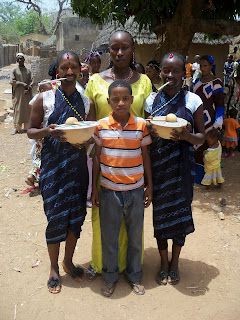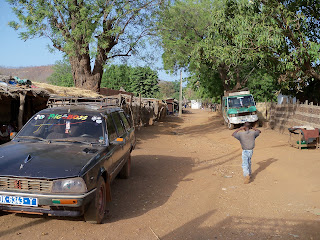Until just a few years ago the Kédougou was just a somewhat forgotten Department within the larger Region of Tambacounda. Now Kédougou has full regional status and over the last year we've been seeing all sorts of changes. For instance, as of last month the National Highway is now completely paved (but it wasn't last year) all the way to the city of Kédougou, our regional capitol, and they've started putting in sidewalks and streetlights along part of the main road through town. There are even (still non-functional) stoplights being installed at the main intersection by the market. It's all very impressive.
Within Kédougou, the Salémata Health District (where I live) is still pretty much the least developed and most isolated. The road out to the Salémata Health Center is rough, unpaved, and often impassable in the rainy season, electricity is scarce, cell phone service is often patchy and weak, and until very recently just about the only radio stations that we could pick up were coming from Guinean stations, missionaries, or the BBC World Service. And then U.S.A.I.D. showed up built this lovely little community radio station and set up a broadcasting tower, which is really fantastic for a variety of reasons.

I didn't even know that the radio station was done (the U.S.A.I.D. agent in our area isn't exactly known for being thrilled about Peace Corps Volunteers) but my host family invited to the inauguration and it turned out to be quite the party; people really wanted to put on a show because the new American Ambassador, Lewis Lukens, actually came out for the inauguration ceremony. Because Americans are stereotypically extremely punctual, people here thought it was funny that he and his entourage showed up a little late (frequently people used to Dakar don't take into account how much slower one has to drive on a washed-out laterite road when calculating driving times) and couldn't stay long, but people were still really glad he'd come. It made them feel like Salémata was important, and that the American government cared about their community specifically.
Middle school students dressed up like traditional Pulaar villagers, drawing on pretend face-tattoos (which you still see on older women sometimes), chewing on teeth-sticks, wearing blue leppi fabric outfits, and carrying traditional decorative woven discs. I gave my camera to Mamadou, my little host brother, and he took some great photos, including these ones of me sitting in the crowd (I'm still shocked sometimes by how much I really just don't blend in at all) and of my host mother Mariama (below left, you can see a snippet of her bright orange headwrap) dragging me up in front while she slipped the griot singers some change and had them sing my name in a song, which is a really nice thing to do for someone.
The Bassaris were the main attraction, though, and they lined up to pose for photos before starting to dance and march around to the music and singing of the griots.
A lot of Mamdou's photos were of his friends posing with the Bassaris or posing with the kids dressed up in traditional Pulaar garb. This his Mamadou and one of our neighbors, posing with my host sister Mariama Gaulo (one the left) and her friend, both dressed up in leppi and make-up.


















